Previous Osterbrock Fellows
The Osterbrock Fellows are UCSC Astronomy grad students who work with the senior fellows getting additional close-at-hand mentoring advice.
|
2023:
2019:
2017: |
2022:
2018:
2016:
|
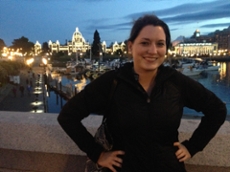
I grew up in a rural part of Kansas where opportunities for science were not abundant, yet astronomy constantly found its way into my life. I received my B.S. and M.S. in physics at Kansas State University, where my research interests revolved around cosmology. I enjoy thinking and researching questions about the evolution of the universe on large scales. Currently I am a part of a JWST NIRCam working group that develops mock catalogs and images. JWST will probe high redshift galaxies and will give insight into the earliest moments of our universe. It is a very exciting time to be an astronomer!
I became interested in being an Osterbrock Fellow because I acknowledge that astronomy is not a field that should be done behind closed doors. It is vitally important for astronomers to communicate their research and express the importance of the field to young students, politicians, and to the everyday person. I dislike the responses I receive after meeting someone (e.g. on a plane) after I’ve told them what I study. Often they shy away from a conversation, or say “Oh you must be one of those SMART people.” Astronomy and astrophysics should not be an intimidating field, and I want to be a part of normalizing this area of study.
One of my main goals during my fellowship is to bring forward the idea that anyone can be an astronomer. As a single mother of a four year old, I have received several comments such as, “Why are you getting your PhD? You’re a mom.” I want to support others in non-traditional circumstances to achieve their goals. Sometimes all it takes is a support system and a little bit of acknowledgment. I believe with the help of the Osterbrock mentors and fellows, we can support astronomers from all backgrounds.
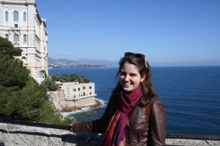 Emily Cunningham is a fourth year graduate student in the Astronomy & Astrophysics department at UC Santa Cruz. In her research, Emily uses the Keck telescopes and data from the Hubble Space Telescope to study the Milky Way's stellar halo. Emily is also very interested in education; she is an instructor for the Project for Inmate Education, a mentor in the Science Internship Program, and the coordinator for the Astronomy Graduate Mentoring Program at UCSC. Originally from New York City, Emily received her B.S. in Physics & Astronomy from Haverford College in 2012 and was a Fulbright scholar in Paris, France from 2012-2013.
Emily Cunningham is a fourth year graduate student in the Astronomy & Astrophysics department at UC Santa Cruz. In her research, Emily uses the Keck telescopes and data from the Hubble Space Telescope to study the Milky Way's stellar halo. Emily is also very interested in education; she is an instructor for the Project for Inmate Education, a mentor in the Science Internship Program, and the coordinator for the Astronomy Graduate Mentoring Program at UCSC. Originally from New York City, Emily received her B.S. in Physics & Astronomy from Haverford College in 2012 and was a Fulbright scholar in Paris, France from 2012-2013.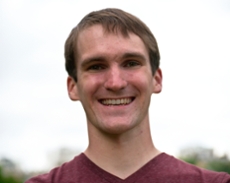 Eric Gentry is a graduate student at UC Santa Cruz, where he studies the intersection of computation and astronomy. In order to better understand the processes that limit star formation in galaxies, he is designing new hydrodynamic simulations and interactive data exploration tools. Eric was previously an undergraduate at MIT.
Eric Gentry is a graduate student at UC Santa Cruz, where he studies the intersection of computation and astronomy. In order to better understand the processes that limit star formation in galaxies, he is designing new hydrodynamic simulations and interactive data exploration tools. Eric was previously an undergraduate at MIT.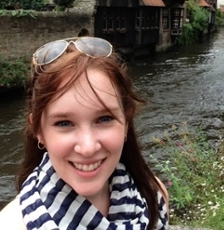 Katie defended her PhD, which focused on cool, dusty stars in the Andromeda galaxy, in 2016. Now, instead of using computational and statistical techniques to study the photometry and spectra of stars, she applies them to the financial world and works as a data scientist at the financial technology startup LendUp in downtown San Francisco. LendUp's mission is to provide anyone with a path to better financial health, and Katie is excited to use all of the technical and leadership skills she developed while a graduate student at UCSC and an Osterbrock fellow towards this end.
Katie defended her PhD, which focused on cool, dusty stars in the Andromeda galaxy, in 2016. Now, instead of using computational and statistical techniques to study the photometry and spectra of stars, she applies them to the financial world and works as a data scientist at the financial technology startup LendUp in downtown San Francisco. LendUp's mission is to provide anyone with a path to better financial health, and Katie is excited to use all of the technical and leadership skills she developed while a graduate student at UCSC and an Osterbrock fellow towards this end.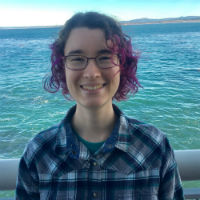
I am a second-year graduate student at UC Santa Cruz. I received my Bachelor’s and Master’s Degrees at the Massachusetts Institute of Technology in Earth, Atmospheric, and Planetary Sciences. My graduate research focuses on characterizing exoplanets in order to constrain planetary formation. Specifically, I determine the bulk densities and atmospheric compositions of planets that have been discovered by the NASA Kepler/K2 mission.
I want to inspire and support future generations of scientists. My long-term goals include improving the diversity in science. UC Santa Cruz Professor Ruth Murray-Clay has begun to improve the retention of diverse students in the the Undergraduate Physics major through a research class for freshmen that strengthens research, classwork, and collaboration skills while creating a sense of community among the students.
The Osterbrock Program is enhancing my graduate experience and providing me with the skills necessary to achieve my goals. Diversity in Astronomy is part of a larger social and political issue. Last June, I had an extraordinary week-long experience exploring scientific leadership in Baltimore, MD and Washington D.C. through the Osterbrock Program. I, along with three other Fellows, interviewed people at all stages of scientific leadership. This valuable experience began to show me how I can affect change.
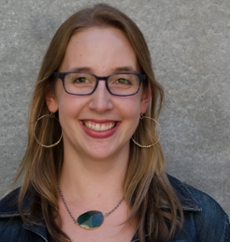 Caroline Morley received her PhD in Astronomy and Astrophysics from UC Santa Cruz in 2016. Previously, she attended the Massachusetts Institute of Technology, where she received dual degrees in Physics and Earth, Atmosphere, and Planetary Science. She was one of the two first Osterbrock Fellows, and she found the process of helping the fledgling program grow and evolve to be both educational and rewarding. During her PhD, she studied the important role of clouds and hazes in the atmospheres of exoplanets and brown dwarfs. She is now a NASA Sagan Postdoctoral Fellow at Harvard University, where she is continuing her work to determine the properties of planets from super Earths to super Jupiters, using computational models to decipher their spectra. Her work provides a foundation to study truly Earth-like planets that may harbor lifeforms like (or unlike!) those on Earth in the decades to come.
Caroline Morley received her PhD in Astronomy and Astrophysics from UC Santa Cruz in 2016. Previously, she attended the Massachusetts Institute of Technology, where she received dual degrees in Physics and Earth, Atmosphere, and Planetary Science. She was one of the two first Osterbrock Fellows, and she found the process of helping the fledgling program grow and evolve to be both educational and rewarding. During her PhD, she studied the important role of clouds and hazes in the atmospheres of exoplanets and brown dwarfs. She is now a NASA Sagan Postdoctoral Fellow at Harvard University, where she is continuing her work to determine the properties of planets from super Earths to super Jupiters, using computational models to decipher their spectra. Her work provides a foundation to study truly Earth-like planets that may harbor lifeforms like (or unlike!) those on Earth in the decades to come. 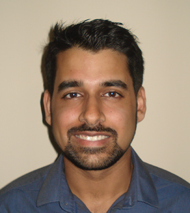 I earned my bachelor’s degree in mathematics and economics from Rutgers University in 2013. If you had asked me three years ago what I would be doing in 2016, I would never have imagined, even in my
I earned my bachelor’s degree in mathematics and economics from Rutgers University in 2013. If you had asked me three years ago what I would be doing in 2016, I would never have imagined, even in my
wildest dreams, that I would be actively working toward a career as a professional astronomer. This despite the fact that I had founded the Rutgers Astronomical Society five years earlier in 2011, and had already immersed myself in the tantalizing world of public outreach. Eventually, through grit, passion, and good fortune, I was able to find my way into the realm of scientific research and meet the great scientists who would later become supportive mentors. It is also because of my great luck that I became one of the first two post-baccalaureate students in astrophysics at Princeton. Through this two-year program, I had the extraordinary opportunity to improve my
understanding of basic physics.In my own research, I prefer to work actively on both theory and observations because that affords me deeper and more comprehensive physical insights about the nature of the objects that I’m studying. My research is broadly focused on the evolution of galaxies both near and far: those that live in the local Universe, those that existed only two billion years after the Big Bang, and the great diversity of galaxies that lie in between. Furthermore, given that galaxies seem to be intimately connected to pretty much everything in the Universe, I try and hope to also use them as bridges to explore and make contributions to other areas of astronomy: exotic transients, high energy astrophysics, the origin of supermassive black holes, and I hope many more topics in the years to come.
As an Osterbrock Fellow, I hope to acquire the skills and experiences that will allow me to eventually serve in leadership roles within the astronomical community. One of my long-term goals is to establish and lead a team such as the Cosmic Assembly Near-infrared Deep Extragalactic Legacy Survey (CANDELS), which is the largest observing program ever undertaken with the Hubble Space Telescope. It has been my privilege to collaborate with and learn from several renowned researchers as a junior scientist in CANDELS. In particular, the opportunity to lead a comprehensive study of galaxy evolution with my CANDELS colleagues has been instrumental in helping me cultivate myself-confidence as a young researcher in the field. Throughout my time as an Osterbrock Fellow and beyond, I hope to develop programs that make it easier for students of all backgrounds to supplement their classroom experiences with leadership roles in cutting-edge scientific research projects and publications.
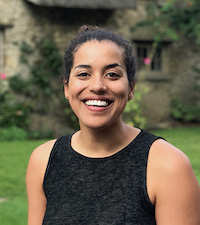
My name is Diana Powell, and I'm from Austin, Texas. I first became interested in astronomy at the age of eight when I did an independent study project on "stars". I was lucky enough to have parents who nourished this newfound passion and I grew up taking advantage of the fantastically clear central Texas sky. Although I dabbled in other career paths (writing, public service, engineering), I decided to attend Harvard University and study astrophysics for my undergraduate degree. I am currently interested in furthering the theoretical understanding of extrasolar planet formation and characterization although I have still maintained a passion for writing and public service.
I am thrilled that the Osterbrock program exists at UCSC and allows for me to cultivate my interests and passions outside of astronomy in an incredibly productive and supportive environment. As an Osterbrock Fellow, I hope to derive a better understanding of the structures that govern astronomy, as well as other fields and organizations, with the hope that this increased understanding will allow me to create lasting positive change. I currently hope to pursue an academic career in which I plan to apply the skills that I learn as an Osterbrock fellow to better myself as a scientist and as a leader.
Diana was recently awarded a prestigious Ford Foundation Dissertation Fellowship based in part on her experiences gained through being an Osterbrock Fellow and Mini-grant PI.
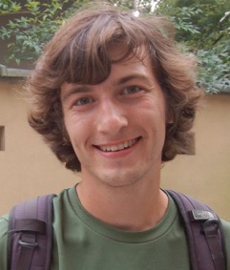 Alexander Rudy is a fifth year Astronomy PhD Student at UC Santa Cruz, studying the evolution of massive galaxies and developing new techniques for adaptive optics systems. He is the current Laboratory Director for the Adaptive Optics Summer School hosted by the Center for Adaptive Optics. Alexander serves as one of the graduate student liaisons to the faculty, working to organize the graduate students and advocate on their behalf. He served as the treasurer of the Graduate Student Commons in 2014-2015. He received a B.A. in Physics from Pomona College in 2011, and spent a year in Taiwan working on various astronomical instrumentation projects as a Fulbright Scholar.
Alexander Rudy is a fifth year Astronomy PhD Student at UC Santa Cruz, studying the evolution of massive galaxies and developing new techniques for adaptive optics systems. He is the current Laboratory Director for the Adaptive Optics Summer School hosted by the Center for Adaptive Optics. Alexander serves as one of the graduate student liaisons to the faculty, working to organize the graduate students and advocate on their behalf. He served as the treasurer of the Graduate Student Commons in 2014-2015. He received a B.A. in Physics from Pomona College in 2011, and spent a year in Taiwan working on various astronomical instrumentation projects as a Fulbright Scholar.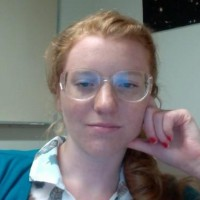 I'm in my sixth and final year of graduate school. My research is focused on understanding how some of the most massive galaxies in our universe came to be the way they are in the present-day. I think a vibrant culture of teaching, mentoring, and community engagement immeasurably helps with the production of high-quality research. In addition to my work as an Osterbrock Fellow, I am a co-organizer of Astronomy on Tap Santa Cruz and I'm known to give public lectures on astronomy at various places around town
I'm in my sixth and final year of graduate school. My research is focused on understanding how some of the most massive galaxies in our universe came to be the way they are in the present-day. I think a vibrant culture of teaching, mentoring, and community engagement immeasurably helps with the production of high-quality research. In addition to my work as an Osterbrock Fellow, I am a co-organizer of Astronomy on Tap Santa Cruz and I'm known to give public lectures on astronomy at various places around town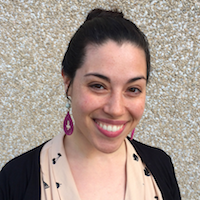
Rosa Wallace Everson is a NSF Graduate Fellow, Eugene V. Cota-Robles Fellow, and Osterbrock Fellow in Astronomy & Astrophysics at UC Santa Cruz, where she studies the evolution of interacting binary stars using semi-analytical and numerical methods, with a focus on common envelope evolution. With Bachelors degrees in both Theatre and Physics, she spent nearly a decade as a professional musician and performing artist prior to training as a scientist. Rosa seeks to integrate her broad experience to bridge science and society, advocate for diversity and inclusion in STEM fields, and inspire and support the next generation of researchers. Recent successes include leading the effort to craft and pass the 2016 Society of Physics Students Statement on Diversity and Inclusivity, which encourages inclusion, support, and retention in undergraduate physics departments on the national level, as well as founding the Osterbrock/Women in Physics and Astrophysics Bridge Scholarship at UC Santa Cruz, which assists undergraduate women and minorities in STEM by directly reducing the financial burden of the graduate school application process.
